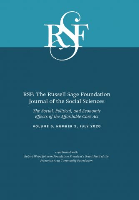
RSF-The Russell Sage Journal of the Social Sciences
Scope & Guideline
Fostering interdisciplinary dialogue to shape policy and practice.
Introduction
Aims and Scopes
- Social Inequality and Justice:
The journal emphasizes research on various dimensions of social inequality, including race, class, gender, and health disparities, contributing to the discourse on social justice and equity. - Impact of Policy and Institutional Structures:
A significant focus is placed on how policies and institutional frameworks shape social experiences, especially among marginalized groups, highlighting the interplay between policy implementation and social outcomes. - Qualitative and Mixed-Methods Research:
The journal encourages qualitative research methodologies alongside quantitative approaches, fostering a richer understanding of social phenomena through in-depth narratives and case studies. - Community and Family Dynamics:
Research on family structures, caregiving, and community responses to crises (like the COVID-19 pandemic) is prevalent, illustrating the importance of social support systems in navigating challenges. - Cultural and Moral Frameworks:
The journal explores how cultural narratives and moral frameworks influence societal behaviors, attitudes, and community cohesion, providing insights into the complexities of social interactions.
Trending and Emerging
- Health Disparities and COVID-19:
There is a marked increase in research addressing health disparities exacerbated by the COVID-19 pandemic, reflecting the urgency of understanding social suffering and institutional responses during crises. - Reparations and Racial Justice:
The theme of reparations, particularly related to Black Americans, has gained significant traction, highlighting a growing interest in addressing historical injustices and promoting racial equity. - Administrative Burdens and Inequality:
Emerging research on administrative burdens—how bureaucratic processes impact access to resources—has become a focal point, emphasizing the need for policy reform to alleviate systemic inequities. - Intersectionality in Social Research:
There is an increasing trend towards intersectionality, examining how overlapping social identities affect individuals' experiences and outcomes, particularly in the context of race, gender, and socioeconomic status. - Impact of Technology on Labor and Society:
Research exploring the implications of technology, gig work, and platform economies on social dynamics and labor markets is emerging, indicating a response to the changing nature of work and its social implications.
Declining or Waning
- Historical Analyses of Segregation:
Though historically significant, the focus on segregation and its historical implications has waned, possibly due to a shift towards more contemporary and actionable research on inequality and social justice. - Urban vs. Rural Disparities:
Research contrasting urban and rural disparities has decreased, potentially as the journal's emphasis has shifted towards broader systemic issues affecting racial and economic inequalities across various contexts. - Monetary Sanctions and Legal Systems:
Topics specifically addressing the nuances of monetary sanctions within legal frameworks appear less frequently, indicating a potential pivot to broader discussions on systemic inequality and social policy.
Similar Journals
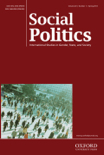
SOCIAL POLITICS
Shaping Future Policies Through Rigorous ResearchSOCIAL POLITICS, published by Oxford University Press, stands as a pivotal journal in the realms of Gender Studies and Social Sciences, boasting an impressive Q1 ranking in both categories as of 2023. Since its inception in 1994, this peer-reviewed journal has become a crucial platform for researchers and scholars to disseminate cutting-edge findings and engage in critical discourse surrounding the intersection of social policies and gender issues. With a Scopus rank of #62/604 in Social Sciences and #22/213 in Gender Studies, it reflects the high standards and impactful contributions made within its pages. Although currently not available as an open-access journal, it seeks to enrich academic dialogue and influence policy-making through its rigorous editorial standards and diverse range of articles. Situated in the academic heart of the United Kingdom, at Great Clarendon Street, Oxford, SOCIAL POLITICS remains an indispensable resource for professionals, researchers, and students dedicated to understanding the complexities of social governance.
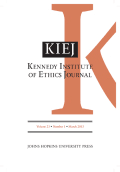
KENNEDY INSTITUTE OF ETHICS JOURNAL
Fostering Rigorous Debate on Ethical Dimensions of HealthThe KENNEDY INSTITUTE OF ETHICS JOURNAL, published by the prestigious Johns Hopkins University Press, stands as a leading periodical in the realm of ethics, particularly emphasizing the intersection of health policy, social sciences, history, and philosophy of science. With an ISSN of 1054-6863 and an E-ISSN of 1086-3249, this journal has been a cornerstone of ethical discourse since its inception in 1991. Renowned for its rigorous peer-review process, the journal boasts impressive rankings, including Q1 in History and Philosophy of Science and Q2 in Health (Social Science) for 2023. Researchers, professionals, and students alike will find this journal invaluable for navigating complex ethical issues, providing a platform for innovative research and discourse. Although currently not offering Open Access, its contributions to the fields of ethics and legal aspects of health are profound, making it an essential resource for those engaged in these critical discussions.

Revista de Antropologia Social
Navigating the Complexities of Human ExperienceRevista de Antropologia Social, published by the Universidad Complutense de Madrid, is a vital resource in the field of Anthropology, featuring a wide range of research that explores cultural, social, and environmental dimensions from both historical and contemporary perspectives. With an ISSN of 1131-558X and E-ISSN of 1988-2831, this open-access journal has been a platform for scholarly communication since 1991, making high-quality research accessible to a global audience. Ranked in the Q3 quartile of anthropology journals in 2023, it reflects a commitment to promoting diverse voices and innovative methodologies within the discipline. While holding a Scopus rank of #339 out of 502 in Social Sciences - Anthropology, this journal stands out not only for its scholarly contributions but also for fostering interdisciplinary dialogue. Researchers, professionals, and students alike can benefit from its robust repository of articles, enriching their understanding of anthropological concepts and practices in the modern academic landscape.
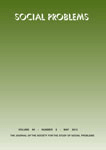
SOCIAL PROBLEMS
Championing the study of social issues for a better tomorrow.SOCIAL PROBLEMS, an esteemed journal published by Oxford University Press Inc, stands at the forefront of the sociology and political science fields. Established in 1973, this journal has evolved to become a key platform for advancing theoretical and empirical research on the pressing social issues of our time, spanning various critical topics such as inequality, crime, health disparities, and policy impacts. With an impressive 2023 impact factor placing it in the Q1 category for both sociology and political science, SOCIAL PROBLEMS is ranked #68 out of 1466 journals in its category, representing the top 95th percentile in Scopus rankings. While not an Open Access publication, the journal maintains a commitment to disseminating influential research and scholarship, enabling researchers, professionals, and students to engage with cutting-edge discussions and findings. For those passionate about understanding and addressing social challenges, SOCIAL PROBLEMS offers invaluable insights and a rigorous academic community.
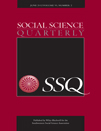
SOCIAL SCIENCE QUARTERLY
Connecting Ideas to Influence Global PolicySOCIAL SCIENCE QUARTERLY, published by WILEY, is a prestigious journal that plays a crucial role in advancing the field of social sciences. With an impressive impact factor and recognized as a Q1 journal in the field for 2023, it stands out for its rigorous peer-reviewed articles that span an array of topics in general social sciences. The journal's comprehensive scope accommodates diverse methodologies and perspectives, making it an essential resource for researchers, professionals, and students alike. Although it does not offer Open Access options, the journal maintains a strong presence in the academic community, ranked #67 out of 275 in its category by Scopus, highlighting its esteemed reputation. The publication has been a vital contributor to social science discourse since its inception in 1970, providing insights that influence policy and practice globally. With its address located in the United Kingdom, SOCIAL SCIENCE QUARTERLY continues to excel in delivering valuable scholarship that shapes the understanding of social phenomena.

SOCIOLOGICKY CASOPIS-CZECH SOCIOLOGICAL REVIEW
Unveiling Contemporary Sociological PerspectivesSociologicky Casopis-Czech Sociological Review, published by the Institute of Sociology, Academy of Sciences of the Czech Republic, is a premier academic journal dedicated to the advancement of sociological thought and research within the field of social sciences. With an ISSN of 0038-0288 and an E-ISSN of 2336-128X, this journal has established its significance since its inception in 1992 and has continuously provided a platform for scholarly discourse through rigorous peer-reviewed articles. Currently ranked in the Q3 category of Sociology and Political Science (2023) and holding the 814th position out of 1466 in Scopus rankings, the journal is vital for researchers who seek to explore contemporary sociological issues and contribute to the empirical and theoretical foundations of the discipline. While it operates under a traditional access model, the journal's articles can be crucial resources for academics, emerging scholars, and professionals eager to engage with diverse sociological perspectives and methodologies. With a commitment to high-quality research, Sociologicky Casopis serves as an essential conduit for sociological scholarship in the Czech Republic and beyond, appealing to a global audience interested in the dynamic interplay of society, culture, and politics.
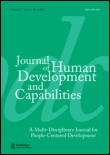
Journal of Human Development and Capabilities
Uncovering the pathways to human flourishing.The Journal of Human Development and Capabilities, published by Routledge Journals, Taylor & Francis Ltd, is a prestigious platform dedicated to advancing the discourse around human development and capabilities. With its ISSN 1945-2829 and E-ISSN 1945-2837, this journal focuses on interdisciplinary research that combines insights from anthropology, development studies, and social sciences, which are highlighted by its notable Q1 ranking in both field categories as of 2023. As a vital resource for researchers, professionals, and students, it offers a rigorous examination of theories, frameworks, and empirical studies that shape our understanding of human potential and well-being. Although it does not operate on an open access model, readers can access its significant contributions from libraries and institutions. Covering a converged period from 2009 to 2024, the journal consistently ranks highly in Scopus, currently positioned at #84 out of 306 in Social Sciences Development, marking it as a leading source for innovative and impactful research.
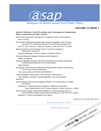
Analyses of Social Issues and Public Policy
Driving Change with Insightful Policy Analyses.Analyses of Social Issues and Public Policy is a distinguished journal published by WILEY that serves as a vital platform for the examination of pressing social issues and the evaluation of public policies impacting communities globally. With an ISSN of 1529-7489, this journal has carved a niche within the social sciences, achieving a notable Q1 ranking in Social Sciences (miscellaneous) and Q2 ranking in Management, Monitoring, Policy and Law for 2023, underscoring its impactful contributions to the field. Operating without an open-access model, it is recognized for its high-quality research articles, reviews, and discussions that promote scholarly discourse and inform policy-making. The journal is based in the United Kingdom and has a converged publication timeline from 2005 to 2024, catering to an audience of researchers, professionals, and students interested in the intersection of social issues and legislative frameworks. As it continues to curate significant findings and innovative approaches, Analyses of Social Issues and Public Policy remains an essential resource for anyone involved in the evaluation and development of social policies.
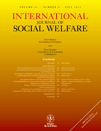
INTERNATIONAL JOURNAL OF SOCIAL WELFARE
Illuminating the complexities of social policy.The INTERNATIONAL JOURNAL OF SOCIAL WELFARE, published by WILEY, stands as a leading platform in the realm of social sciences, specifically addressing the fields of Social Work and Sociology and Political Science. With an impressive Impact Factor and a consistent ranking in the Q1 and Q2 quartiles, this journal is highly regarded for its contribution to the discourse surrounding social policy, welfare systems, and societal issues on a global scale. The journal engages authors and readers alike by publishing original research, insightful reviews, and critical analyses that illuminate the complexities of social welfare practices from 1996 to the present. Available through Open Access options, the journal ensures that vital research findings are accessible to all stakeholders and the service address in the United Kingdom reflects its international outreach. As a vital resource for academics, practitioners, and policymakers, the INTERNATIONAL JOURNAL OF SOCIAL WELFARE plays a crucial role in enhancing understanding and fostering improvements in social welfare systems worldwide.

LGBTQ Family-An Interdisciplinary Journal
Uncovering the Complexities of LGBTQ Family LifeLGBTQ Family: An Interdisciplinary Journal, published by Routledge Journals, Taylor & Francis Ltd, is at the forefront of advancing scholarship in the fields of gender studies and social sciences. With an impressive 2023 impact factor that places it in the Q1 category for both Gender Studies and Social Sciences (Miscellaneous), this journal serves as a pivotal platform for researchers, professionals, and students dedicated to exploring the complexities and dynamics of LGBTQ family structures. Launched in 2022 and set to converge until 2024, it encourages a rich interdisciplinary dialogue, contributing to knowledge that is often overlooked. Although not currently open access, the journal offers vital insights and promotes discussion on contemporary family frameworks within LGBTQ communities, driving impactful research that can influence policy and social change. With a discerning audience in mind, LGBTQ Family is essential reading for those aiming to broaden their understanding of family diversity and advocate for inclusivity.